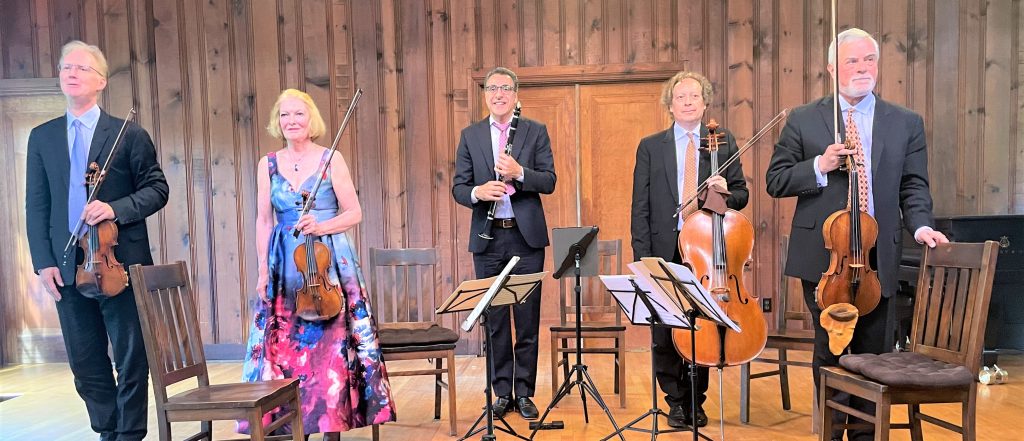
There is nothing that I, or anyone else can say, to enhance the reputation of the American String Quartet (which is legendary). They opened with String Quartet in B Flat Major, Opus 18, # 6 (1800) by Ludwig van Beethoven. Having studied under Haydn, Beethoven knew that Haydn had received a commission to compose six quartets; in a spirit of competition, Beethoven decided that he would also write a series of six quartets. While the first three remain influenced by Hayden (Beethoven had copied out Hayden’s E-flat quartet, op. 20 as a preparation). The last three of the series strike a more contemporary direction announcing his voice.
The subject of no. 6 is a personal analysis of depression. Moving beyond music, it delves into psychology, a subject not yet invented. Beethoven’s handling would be buffa, that is, he would take a comic approach to his misery, probably because of his digestive difficulties at the time. While the broad muscular opening recalls Haydn’s style without his humor, Beethoven will move to subvert Haydn’s genial optimism. What remains remarkable is that the second violin, marvelously played by Laurie Carney, is not a supportive role; it offers a satiric voice to the more public, extroverted first violin fiercely played by Peter Winograd. In the third movement Scherzo, Daniel Avshalomov on viola excelled at delivering manic gaiety. In the closing fourth movement, Wolfram Koessel on cello with rapid low notes provided the comic gravity that highlighted the self-satire on Beethoven’s melancholy condition (the movement is called La Melinconia), as the violin of Peter Winograd soared in nearly strident, faux ecstasy. Unlike Haydn’s public voice, the quartet presents the author’s singular voice, which will become a hallmark of the Romantic movement.
Oskar Espina Ruiz, Director of Music Mountain, joined the American String Quartet to play Clarinet Quintet in B Minor, Op. 115 (1891) by Johannes Brahms. When the name Brahms pops up, one does not immediately think of the clarinet, yet in old age, Brahms became obsessed with the clarinet and composed four wonderful works for that instrument due to his discovery of a remarkable clarinetist, Richard Muhlfeld whom he acclaimed as the greatest wind player living, and Brahms bestowed the performing rights on those works composed for him. This joyfully extroverted showcase composition, which took four years to write, has been called a “clarinet concerto with strings,” yet Brahms had labeled the work as “a folly.”
No other work by Brahms enjoys such harmonious sonority tinged by autumnal resignation, especially in the tender sweetness of the lower register where Ruiz so excelled. High notes possessed a magisterial timbre. Color and tonality flowed with rhapsodic ease and mellow reverie, as the clarinet behaved like a solo instrument beholden to none. There is intense gratitude and happiness in the dream of a life fulfilled with achievement and satisfaction. One could get lost in the happy harmonies of the clarinet amid the supporting counterpoint of strings. The clarinet appeared to be a casual and carefree instrument that soared beyond the capacity of strings to emit heavenly music beyond categorization as if he was declaring that the clarinet might possibly be superior to the piano….
The audience demanded two strikingly lengthy bows.

After intermission String Quartet in F Major, Op. 96 by Antonín Dvořák, nicknamed “American.” The work was composed during the summer of 1893 in Spillville, Iowa, where Dvořák had settled with his family, listening to native American tunes in the local Czech community while he composed the first draft of this happy quartet in three days, completing the work over the next thirteen days. This was the second work he wrote in the United States.
The opening melody of the first movement was dominated by Daniel Avshalomov on viola with a question-and-answer melody that invites the listener into a conversation as if two people were sitting on a rural porch engaged in conversation and the audience was a third party overhearing the conversation. Some commentators connect the assertive viola to the opening of From My Life by Bedřich Smetana.
The following Lento introduces melodic material with accents on the third and seventh note of the Minor Scale which is a characteristic signature of the Blues. The notably melodic third movement where Peter Winograd on first violin excelled, is based on birdsong that Dvořák heard during a walk at dawn, a movement everyone finds simply delightful.
The fourth movement features syncopation, which is a feature of Czech music (as well as a prominent signature of American jazz); here cellist Wolfram Koessel and Laurie Carney on second violin were able to influence the hectic sense of jazz improvisation with an ecstatic blend of instruments that delivered such astonishing nuance that they made new and memorable a work that I have heard many times, yet this was the most accomplished version of the many performances of this work that I have heard!

Next week at Music Mountain will feature Erinys Quartet & Victoria Schwartzman, Piano
Kaija SAARIAHO Terra Memoria
Béla BARTOK String Quartet #3, Sz. 85
Wolfgang Amadeus MOZART String Quartet in B Flat Major, K. 589
Antonin DVORAK Piano Quintet in A Major, Opus 81